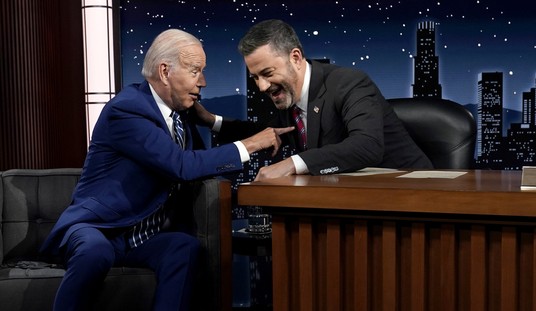Unions and Democrats — but I repeat myself — insist that they need to recall Wisconsin Governor Scott Walker because of his arrogance and unreasonable approach to governing in shoving public-employee union reforms through the legislature after, er, campaigning in part on the issue. How reasonable are unions and Democrats prepared to be if they do manage to replace Walker? Unions have demanded a litmus test of prospective challengers that would require them to throw Wisconsin into a budget and constitutional crisis upon taking office (via Lakeshore Laments):
Union leaders are asking Democratic candidates for governor to veto the next state budget if it doesn’t restore collective bargaining for public workers and one leading candidate – Kathleen Falk – has agreed, participants in the private meetings say.
The plan, which could lead to shortages or even layoffs in government if it doesn’t succeed, is a key strategy that union leaders are considering for undoing Gov. Scott Walker’s repeal last year of most collective bargaining for public employees. Falk, the former Dane County executive, has committed to restoring collective bargaining in the next state budget and vetoing the budget if those provisions come out, while at least three other candidates including Milwaukee Mayor Tom Barrett said they wouldn’t commit to any one strategy to accomplish that.
“The governor’s job is to veto budget items that don’t reflect citizens’ values. That’s why a million people signed recall petitions – because Scott Walker’s budgets didn’t reflect citizens’ values,” Falk spokesman Scot Ross said. “All the support she’ll receive is because she the best candidate to take on Gov. Walker’s divisive, extreme, national tea party agenda and bring Wisconsin back together.”
Yeah, because nothing says moderation than vetoing an entire budget if it doesn’t include a provision that allows the PEUs to force Wisconsin citizens to overpay for union-owned health insurance. At least one Democrat has refused, and blasted the union for an essentially unserious demand:
Sen. Tim Cullen (D-Janesville), who briefly considered running against Walker in a recall election, said that he was asked by leaders of public employee unions if he would veto any state budget that didn’t restore collective bargaining.
“I said I could not make that promise and I did not think any serious candidate for governor could or should make that commitment,” Cullen said of a veto of the state budget. “It’s a $60 billion document.”
Cullen noted that the state budget also deals with other key priorities for voters such as health care, education and taxes. Cullen said Republicans would be unlikely to agree to restoring collective bargaining in the budget, setting up a potential stalemate that could drag on for months like the state budget standoff in 2007.
The GOP would retain control of at least one chamber of the legislature no matter what happens in the recall election, so a PEU-reform repeal would be extremely unlikely. The same reality has also crossed Milwaukee Mayor Tom Barrett, who lost to Walker in 2010 and is considered the best hope for Democrats in the recall, also publicly rejected making such a commitment, although Barrett said that he wouldn’t rule anything out or in. That leaves Falk as the union-backed candidate, and their platform as something akin to “We’ll throw lots of government workers into the unemployment line if you don’t restore WEAC bargaining,” or something. That’s a winning message against a governor who has balanced the state budget without raising taxes and who has a 51% approval rating.
Republicans have to be delighted to have been handed this line of attack:
The union request and Falk’s commitment brought withering criticism from Republicans, who said the move would be bad for the state and wouldn’t succeed with the GOP-controlled Legislature.
“This backroom deal reeks of pay-to-play,” state Republican Party spokesman Ben Sparks said.
There’s certainly nothing like advertising that you’re a wholly-owned subsidiary of the unions to frame a political campaign these days, is there? It’s a measure of the desperation Big Labor and Democrats — there I go being redundant again! — are feeling as states struggle to reform budgets and get control of their public-sector costs and private-sector economic stagnation. In my column for The Fiscal Times today, I look at the arguments being made against Indiana’s new right-to-work laws and show what’s really at work is panic over losing a big revenue stream that keeps Democrats in power and the status quo in place:
Working from data provided by the federal Bureau of Economic Statistics, the NILRR looked at the ten years ending in 2010 to see whether right-to-work or “forced-unionism” states performed better economically. Not only did RTW states show more job growth (RTW: 0.3 percent; forced unionism states: -5.5 percent; national average: 3.3 percent), real compensation grew by 11.3 percent. In states with closed shops, real compensation only grew 0.7 percent over those ten years while real compensation grew nationally at a 4.3 percent pace.
How did that impact the economic structure of these states? Manufacturing grew in forced-unionism states by 8.3 percent during that decade – but it grew by 18.6 percent in right-to-work states. As far as standards of living, the data disputes Dayton and other opponents of right-to-work laws. By 2010, income adjusted for the cost of living by the BEA was slightly higher in right-to-work states, as was cost-of-living adjusted real disposable income.
Nor was the NIRLL the only one to check those figures. Dr. Mark Perry, professor of economics and finance at the University of Michigan, checked the BEA’s figures and reported his findings on his personal blog, Carpe Diem. Perry confirmed the NIRLL’s findings on private-sector compensation growth, and found a few more nuggets as well. Private sector employment grew by 10 percent in the same decade in RTW states, while the rate in forced-unionism states was only 1.9 percent.
Perry also specifically looked at the 2000-7 period for employment and found this stunning result: “In the period between 2000 and 2007 — before the recession started — almost 8 million jobs were created in right-to-work states compared to fewer than 6 million new jobs in forced union states, even though forced union states outnumber right-to-work states 28 to 22 and have populations and labor forces that are 65 percent greater than right-to-work states.”
Clearly, right-to-work states outperformed their counterparts across a wide range of economic measures. Why, then, are Democrats like Governor Dayton so opposed to right-to-work laws? Survival. Democrats rely heavily on union support, both in organization and fundraising. Both depend on the collection of dues from millions of members locked in closed shops, who have their paychecks picked by their employers no matter what they think of their union. Since Democrats in Indiana get a third of their donations from these forced contributions to unions, the rights of workers and the economic vitality of their states take a back seat to keeping their own coffers filled.
We’re seeing a Rust Belt revolution, and it’s breaking out in places like Arizona as well. The days of wine and roses funded by taxpayers and employees in closed shops are coming to an end, and the beneficiaries of that pocket-picking are trying desperately to keep those mechanisms in place.








Join the conversation as a VIP Member